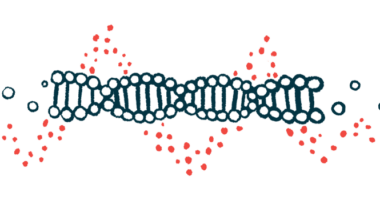Gene therapy SRP-9001, now Elevidys, OK’d for Duchenne MD
Approved for children ages 4-5 who can walk, have confirmed mutation

The U.S. Food and Drug Administration (FDA) granted accelerated approval to the gene therapy SRP-9001 (delandistrogene moxeparvovec) for children ages 4 to 5 with Duchenne muscular dystrophy (DMD) who can walk and have a confirmed mutation in the DMD gene.
The treatment is now named Elevidys (delandistrogene moxeparvovec-rokl).
“The approval of Elevidys is a watershed moment for the treatment of Duchenne. Elevidys is the first and only gene therapy approved for Duchenne and this approval brings us closer to our goal of bringing forward a treatment that provides the potential to alter the trajectory of this degenerative disease,” said Doug Ingram, president and CEO at Sarepta Therapeutics, the therapy’s developer, in a press release.
The therapy’s continued approval may depend on whether it shows sustained clinical benefits in confirmatory clinical testing.
A global Phase 3 clinical trial called EMBARK (NCT05096221), which is now fully enrolled, will serve as the post-marketing confirmatory study. It’s assessing Elevidys against a placebo in boys with DMD, ages 4 to 7. The study’s main goal is to compare one-year changes in motor function.Top-line results are expected later this year, according to Sarepta, which may support expanding the therapy’s’ approved indication.
“If EMBARK confirms the benefits seen in our prior trials, Sarepta will move rapidly to submit a [Biologics License Application] supplement to expand the approved label as broadly as good science permits,” Ingram said.
Sarepta’s patient support program, SareptAssist, provides information about financial assistance, insurance benefits, and other resources. It can be reached at 1-888-727-3782.
“Today’s approval addresses an urgent unmet medical need and is an important advancement in the treatment of Duchenne muscular dystrophy,” said Peter Marks, MD, PhD, director of the FDA’s Center for Biologics Evaluation and Research, in a separate press release. “The FDA remains committed to facilitating the development of innovative new therapies to reduce the impact of debilitating diseases and to improve outcomes and quality of life for those affected.”
Elevidys’ recommended dose is 1.33 ×10E14 vector genomes per kilogram of body weight. The gene therapy is given intravenously (into the vein) in a single infusion. Elevidys is contraindicated for patients with any deletion in exon 8 and/or exon 9 in the DMD gene. Exons are the coding sections that have the information to produce proteins.
As part of its approval, the FDA considered the potential risks associated with the gene therapy, Duchenne’s life-threatening and debilitating nature for these children, and the urgent unmet medical need. Data from EMBARK will be reviewed as quickly as possible to consider if a revised indication or withdrawal of Elevidys may be necessary, according to the FDA.
A decision was expected in May, but the agency delayed its review process. Late last year, the agency agreed to review the application under its accelerated approval pathway. This pathway lets the agency give conditional marketing authorization to medications based on early clinical trial data that suggest a likely benefit.
The FDA has since concluded that existing data shows an increase in so-called Elevidys micro-dystrophin is reasonably likely to predict clinical benefit in children ages 4 to 5 with DMD who don’t have significant preexisting antibody levels against the viral vector used to deliver it or have other contraindications based on the inclusion criteria of clinical trials.
Countdown to approval of Elevidys
The therapy’s clearance was based on data from three early-stage trials showing it was associated with an increase in micro-dystrophin levels, as designed. Micro-dystrophin is a shorter, but working version of dystrophin, the protein lacking in DMD. The therapy resulted in motor function improvements relative to what is typically seen in DMD patients, trial data also suggested.
In May, an FDA advisory committee voted narrowly in favor of the accelerated approval, supporting the use of micro-dystrophin levels as a surrogate marker of Elevidys’ effectiveness.
Around the same time, Parent Project Muscular Dystrophy (PPMD) provided the agency new data showing the DMD community is willing to accept significant risk if a therapy can slow disease progression.
The DMD gene is the longest in the human genome, containing 79 exons. Its size has represented a challenge in designing gene therapies that can be packaged inside a vehicle.
Elevidys uses a modified and harmless adeno-associated virus to deliver a gene encoding Elevidys micro-dystrophin to muscle cells. By increasing the levels of a trimmed-down, working version of dystrophin, the therapy is expected to slow or prevent the damaging effects that dystrophin deficiency has on muscle health.
Elevidys’ approval was mainly supported by data from a completed proof-of-concept Phase 1/2 study (NCT03375164) and an ongoing placebo-controlled Phase 2 trial called Study 102 (NCT03769116) of 45 DMD boys, ages 4-7 at enrollment, who were able to walk.
The proof-of-concept study showed a single dose resulted in motor function and walking improvements in four patients at three years post-treatment.
The Phase 2 trial, which tested Elevidys in 41 patients, failed to meet its main goal of showing it was significantly superior to a placebo at improving motor skills after nearly a year. Prespecified analyses on boys, ages 4-5, showed a superiority, however.
Participants who later switched from a placebo to the therapy saw significantly greater motor improvements relative to a matched, external group of untreated patients.
Safety and efficacy data from the ongoing open-label Phase 1 ENDEAVOR trial (NCT04626674), which tested Elevidys in up to 46 DMD patients who were able and unable to walk, were also given for FDA review.
Across the three trials, one-year data from 52 patients treated at the dose currently up for approval suggested Elevidys was generally safe and that these patients had better motor function than a matched, external patient group.
“Duchenne is a relentlessly progressive, degenerative disease, robbing children of muscle function,” said Jerry Mendell, MD, pediatric neurologist and principal investigator at the Center for Gene Therapy at Nationwide Children’s Hospital, where the gene therapy work that led to Elevidys first started. “The increases in ELEVIDYS dystrophin expression and the functional results that we see can make a difference in the lives of our patients.”
The most common side effects found in clinical studies were vomiting, nausea, elevated liver function tests, fever, and low platelet counts.
Ahead of Elevidys approval, the Muscular Dystrophy Association launched a Gene Therapy Support Network with resources and education about gene therapy for people with neuromuscular diseases.
“As we prepare to launch ELEVIDYS, we should acknowledge and celebrate the decades of dedication and work from the patient community, families, clinicians, and our Sarepta colleagues that resulted in today’s approval,” Ingram said.
“Today’s decision marks an important moment in gene therapy for patients living with Duchenne,” said Pat Furlong, founding president and CEO at PPMD. “It’s been the lifelong work of so many in the Duchenne community. Our work continues until all patients in our community have access to therapy.”






